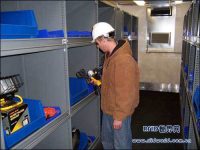
RFID automatic tracking of construction site mobile tools
[ad_1]
In the fast-paced construction environment of construction sites, such as power stations and other industrial sites, tools are often lost or not returned in time, causing other workers with tool needs to be unable to work normally, resulting in production delays and increased costs.
Usually, a construction site, such as a power station, rents a tool trailer, and multiple sub-contractors and hundreds of workers enter and exit the trailer to retrieve the tools. Site managers use paper and pen to record the entry and exit of tools. However, this manual system is very inefficient and cannot cope with the worksite environment around the clock. Few tool managers can track tools on site 24 hours a day, so some tools leave the trailer but are not properly registered.
Two professional RFID solution providers WinWare Inc. and Jobsite Resources-separated from the tool trailer rental company Leasco Equipment Services, and jointly developed a solution CribMaster RFID mobile tool station (MTF). This plan includes a 53-foot trailer with tools loaded, and RFID doors installed at the entrance of the trailer-where workers pass in and out of the tool. The RFID tag in the worker’s work permit and the RFID tag attached to the tool correspond to each other in the software, so that on-site management personnel can know which tool has left the trailer and the worker’s identity, and which tools and materials need to be replaced or supplemented.

A worker selects a tool, then walks out of the trailer, passes through the RFID door to read the ID tag and tool tag
Jobsite Resources established a cooperative relationship with WinWare in the early days of its establishment in 2008. The latter provided CribMaster, a set of RFID software and hardware solutions for tracking tools in fixed scenarios. Jobsite Resources and WinWare jointly opened an RFID door that can be mounted on a trailer.
At the beginning of this year, Leasco started using RFID trailers with CribMaster doors. Mike Green, Chairman of Jobsite Resources, stated that the plan is to be officially launched at the end of 2009. Leasco has tested the trailer on several customer sites in Ohio Valley and learned about the time when the tool was retrieved and the identity of the corresponding worker.
Using this solution, WinWare marketing director Robert Holmes said that each tool-using worker wears a certificate with UHF Gen 2 RFID tags. When the worker approaches the locked tool trailer, a Motorola reader and three antennas on the CribMaster door capture the ID code of the document. Then the ID code is sent to a computer in the trailer that is wired to the CribMaster door, and the computer determines the identity and authority of the employee. If the identity verification is passed, the trailer is unlocked and the worker enters the trailer.
In the trailer, hammers, grinders and other tools are affixed with CribMaster labels of different sizes and shapes (depending on the tools attached). When the worker took out the tool and walked out of the trailer, he passed the CribMaster door for the second time. At this time, his ID code and tool tag ID code were read by the reader again. The system records the worker taking these tools.
The software translates the data, matches the worker with the tool taken, and provides information to other people seeking the same tool. If a tool is not returned in time, the software will send an alert to the company’s management. When the quantity of a certain type of material reaches the preset threshold, the system will also automatically send an order for replenishment. In addition, the management can also use software to analyze the use of tools on the site and better predict the number of tools and materials used in similar projects in the future.
According to Green, the CribMaster door can be retrofitted and installed on an existing trailer, or it can be purchased directly from a 53-foot trailer with an RFID door. He said that the trailer customer could be a tool rental company, such as Leasco, or a construction site owner, such as a power station, petrochemical, and construction company. “This system improves the efficiency and accountability of tool management.”
WinWare and JobSite Resources also plan to install RFID doors on a 40-foot trailer.
The development of this system took more than a year. WinWare provided RFID hardware and software, JobSite Resources provided trailers, and debugged the hardware installation in a high-metal environment. The biggest challenge of this system is how to ensure that the RFID door will not read the tool tag.
Finally, the two companies developed an RFID entrance and exit with a door to separate the inside of the trailer from the RFID door to solve this problem. Atlas RFID, an RFID consulting company, also provides integrated services, adding touch controls and alarm sounds at the entrance and exit (if unauthorized persons enter the trailer).
[ad_2]




